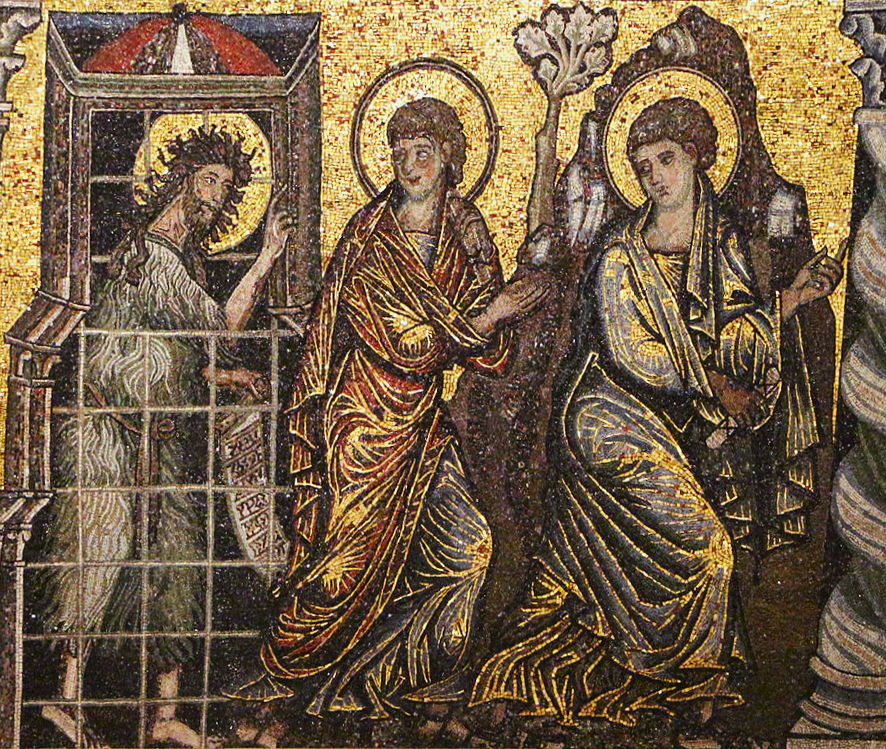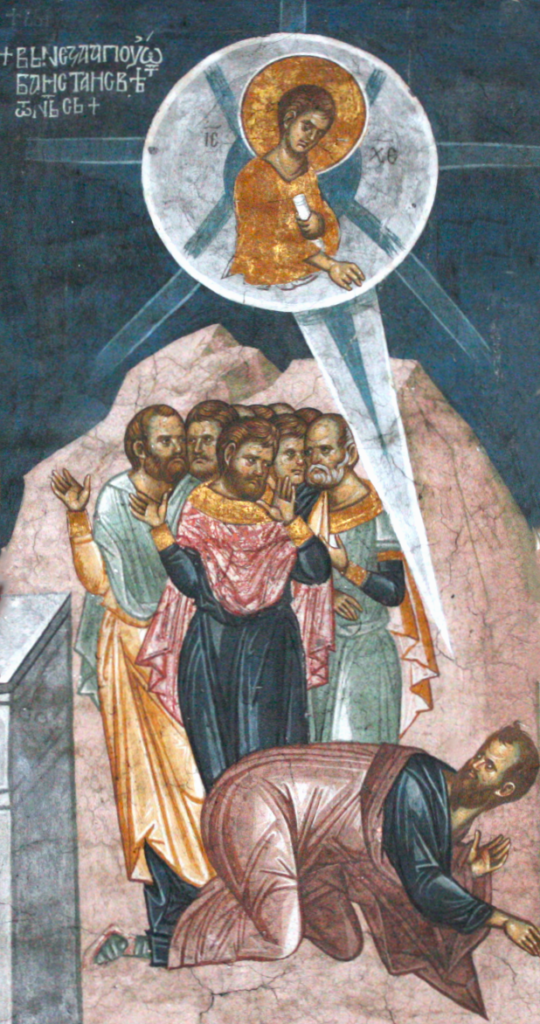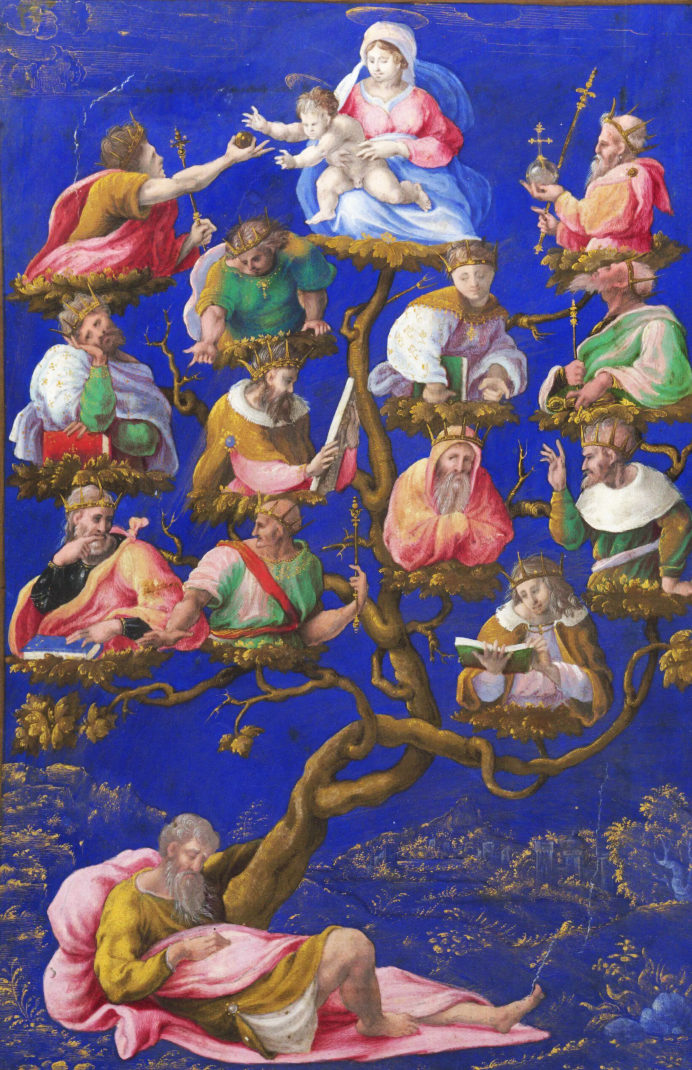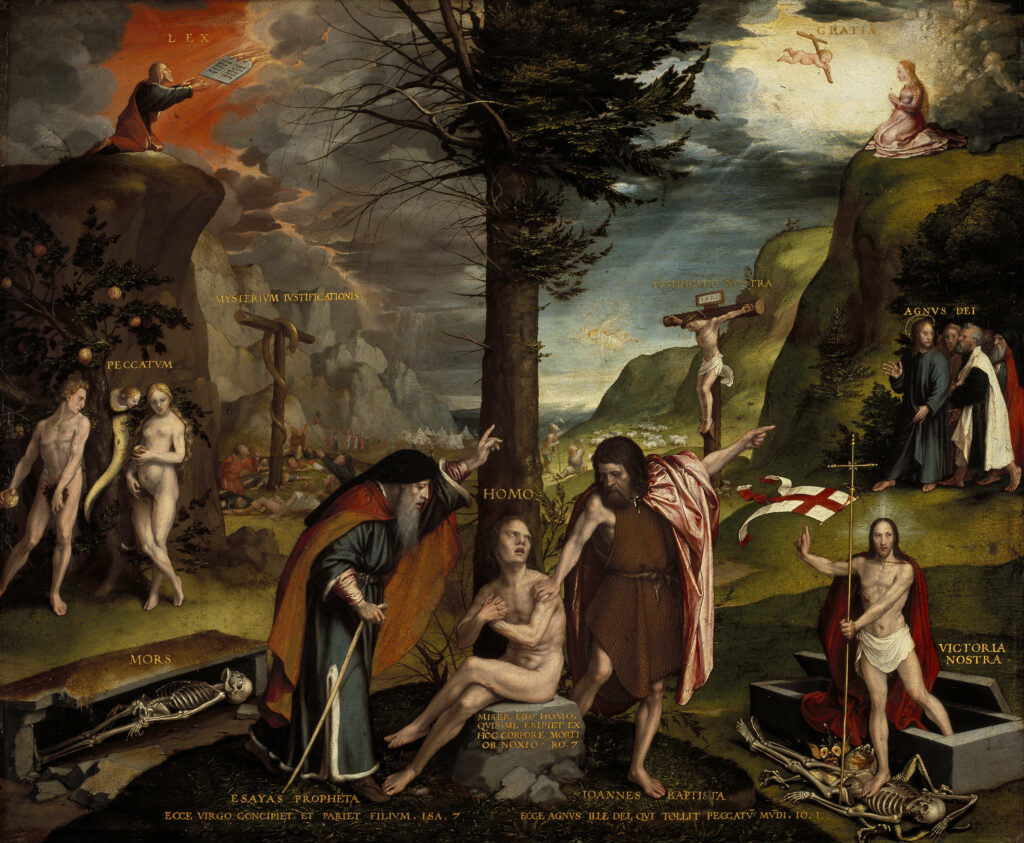Translation of the Epistle of St. Paul to the Romans for the Second Sunday of Advent
Brethren, What things soever were written, were written for our learning: that, through patience and the comfort of the Scriptures, we might have hope. Now the God of patience and of comfort grant you to be of one mind according to Jesus Christ, that with one mind and one mouth you may glorify the God and Father of our Lord Jesus Christ. Wherefore receive one another, as Christ also hath received you unto the honor of God. For I say that Christ Jesus was minister of the circumcision for the truth of God, to confirm the promises made unto the fathers: but that the Gentiles are to glorify God for His mercy, as it is written: Therefore will I confess to Thee, O Lord, among the Gentiles, and will sing to Thy Name. And again He saith: Rejoice, ye Gentiles, with His people. And again: Praise the Lord, all ye Gentiles, and magnify Him, all ye people. And again, Isaias saith: There shall be a root of Jesse; and He that shall rise up to rule the Gentiles, in Him the Gentiles shall hope. Now the God of hope fill you with all joy and peace in believing: that you may abound in hope, and in the power of the Holy Spirit.
Continuation of the Holy Gospel According to Saint Matthew
At that time, when John had heard in prison the works of Christ, sending two of his disciples, he said to Him: Art thou He that art to come, or look we for another? And Jesus, making answer, said to them: Go and relate to John what you have heard and seen. The blind see, the lame walk, the lepers are cleansed, the deaf hear, the dead rise again, the poor have the gospel preached to them: and blessed is he that shall not be scandalized in Me. And when they went their way, Jesus began to say to the multitudes concerning John: What went you out into the desert to see? A reed shaken with the wind? But what went you out to see? A man clothed in soft garments? Behold they that are clothed in soft garments are in the houses of kings. But what went you out to see? A prophet? Yea I tell you, and more than a prophet. For this is he of whom it is written: Behold, I send my Angel before Thy face, who shall prepare Thy way before Thee.
The Saving Words of the Gospel.
In the Name of the Father, and of the Son, the Holy Ghost. Amen.
Transcription of Homily
As the days are shortest, and in the darkness of a fallen world, in the darkness of our own faith, in which we believe by hearing, and… we are presented with this image of John in his own darkness, his own interior darkness, his exterior interior darkness of the prison cell, and who is this John? He is a bridge between the Old Testament and the New, the last of the prophets, and, as Our Lord says, more than a prophet. And the placement of this episode is right after two chapters that we’ll discuss, eight, and nine, and ten, that we’ll discuss – “The Signs or the Works of the Christ”, as Matthew calls them. And then, at the very end of this Chapter, in Chapter 11, we see what are called the “Works of Wisdom”. And so, those act as kind of bookends for this episode that the Church presents to us for the Second Sunday of Advent.

John, in prison, sends his disciples to ask Christ this all-important question. John, as you know, went out to the desert to live as a hermit. He didn’t have intimacy with Christ. He didn’t have the presence of the Eucharist. He didn’t have the memory of the Passion of Christ. All he knew was this is the will of God for him to go out into the desert to live as a hermit, and to say what Our Lord directed him to say. And now, he seems to be in a certain darkness here, and he’s compelled to send his disciples to ask Our Lord.
Notice that as he asks in the first-person plural, Are you the one that we await? Or should we (including himself) expect another? And Our Lord responds with words that we’re going to find towards the end of the Gospel when He says, Go ye therefore, teaching all nations. Well, Our Lord responds and says, Go and relate to John what you have seen and heard. Notice that He says, What you have seen and heard. John has only heard, he hasn’t seen, and these disciples, though, have been witnesses of the works of the Christ. Notice too, that Our Lord says, What you have seen and heard. He doesn’t send them as emissaries. He doesn’t send them as ambassadors who are carrying the message of someone else. He tells them to come to their own conclusions.
‘You’ve seen, you’ve heard, and then what have you seen, what have you heard?’: The blind see, the lame walk, lepers are cleansed, the deaf hear, the dead rise again, the poor have the Gospel preached to them. So, these are all of the signs of the Messiah that Isaiah had prophesied. And Isaiah said, These are the signs:, and he puts them in the future tense. Christ puts them in the present. This is all happening now. You’ve seen it. You’ve heard it. Notice too, the modesty and the humility of Our Lord in laying out the proof, but He doesn’t impose it with His own majesty and His glory, He says, ‘This is the proof, you come to your conclusion,’ obviously under the action of grace.
So, He gives them enough in order to know the truth and to act on it, but He wants them to interiorize it, to make it their own, not to just say, ‘Well, we asked Him, and this is what He said.’ ‘No, this is what we have seen, what we have heard. And this is the way it is.’ He wants them to be invested. He wants them to be all in. Not as simple middlemen, or gopher, who’ve got the message from someone else. This becomes their own message. ‘He is the One that we’ve been waiting for.’ All of the prophecies of the Old Testament have now been distilled down to Jesus Christ and they converge in Him. ‘This is what we’ve seen. This is what we’ve heard.’ So, He forces them to come to their own conclusions, and with that comes a huge responsibility.
The Jews saw and heard. They made their own choices. He said, ‘You’ve seen, you heard, make your choice and act on it.’ And this is a choice that is existential. It’s not something we can put off. They’re not called to simply transmit facts. When Our Lord quotes Isaiah, what He doesn’t say are the lines of Isaiah that came right before the Messianic Signs: And he [Isaiah] talks about God coming with vengeance, God coming with a sword, with distributive justice. He doesn’t say that, but Christ is the fulfillment of that. He says Himself, I have not come with peace, but with a sword. And what is it that He decimates? It’s all of those things that are not of God’s making; sin and evil.
This Gospel starts with these words: In illo tempore / Εν εκεινο τω καιρω [en ekeino tō kairo] / At that time. And this is a privileged moment of action, divine action, in human history. And when repeated in the liturgy, in a certain sense, we have access to that mystery, it becomes present to us. It’s a singular moment at that time because all of this is foreordained by providence. And it’s not something that’s left in the past but in the Divine Liturgy, these mysteries of the life of Christ, although lived out 2,000 years ago, are made present in a mysterious way. So, when Matthew starts this Gospel with those words, he’s teeing us up for an all-important, central, existential message.
And what Christ is saying is that all of these signs, these Messianic Signs… actually with the way Matthew relates it, the words of Christ (it’s in Greek), it’s beautiful poetry. This is probably one of the most poetic passages you’ll find in the Gospels because of the way Matthew lays it out. We lose it in translations.
But Our Lord is talking about an indirect proof of His divinity. These are the effects: Broken man, dis-integrated man, is restored; only God can do that. So, notice He’s showing the effects in an indirect way so that these conclusions become truly our own. They’re not imposed on us. But then He ends this series of Messianic Signs with a new beatitude: Blessed is he that shall not be scandalized in Me.
What’s a scandal? σκανδάλον [skándalon] A scandal is something you trip over. And so, this is rock, which is a scandal for the Jews, and is a scandal for anyone who doesn’t accept the Cross, who doesn’t accept Christ, is not something John and his disciples trip over. This scandal, this rock, then becomes the cornerstone for the Mystical Body, the Church, upon which the entire Body is built. Christ Himself is the scandal. The scandal that He who is the Word made flesh is going to be crucified and die and that’s why He came. And so, this is as Paul says, lunacy for pagans and a scandal for the Jews.
Blessed is he that is not scandalized in me.
Now, when Our Lord reiterates these Messianic Prophecies from Isaiah, it’s word for word what Isaiah said, but He leaves something out. He leaves the last one out; that prisoners shall go free. So, he’s letting John know (by not saying that), ‘John, you are in the right place to give witness to me and to the truth of the Gospel.’ So, John is assured that Christ is the Anointed One, the Messiah, He is the Christ, and can go in peace. His mission is fulfilled. These two disciples, much like the disciples of Emmaus at the end of Luke’s Gospel, then go with great joy to tell John the good news of Jesus of Nazareth. In a certain sense, this was the last stripping of John. He lost his last possession, his disciples, as Christ appropriates them, and turns them into His own disciples, and sends them to John to evangelize John.
And so, this is the Gospel that the Church presents to us on the Second Sunday of Advent year after year after year and the message is always actual, it’s always personal, it’s always existential: Who is Christ? Who do you say that I am? He asks us, and the answer we give has to be one of conviction.

Sometimes we can hear Catholics speak about Christ, or the Church, or the Faith, and it sounds almost as if they’re speaking of an ideology, or something, a sociological reality, something cultural. But if we are meeting Him daily in mental prayer, if we’re spending long periods with Him in Adoration, if we are allowing Him to work on our consciences and thereby direct our thoughts, our words, our actions, we’re giving an answer to that question by becoming an incarnation, so to say, of Christ in time, allowing Him, as Paul says, ‘to take possession of us.’ Paul says καταλαμβάνω [katalambano] took possession of me. What a radical beautiful truth that is. You never find anything like that in scripture or outside of scripture. He came and took possession of me. In a certain sense, I’m sure, that that was the experience John the Baptist had when he knew the full truth in the midst of his trials.
And that’s our vocation as well. And this is the question we’re asked. And we can’t tarry in giving a response.
In the Name of the Father, and of the Son, the Holy Ghost. Amen.
— Fr. Ermatinger


